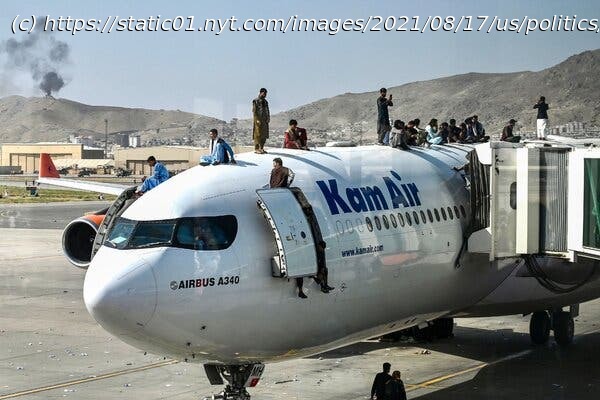The fall of Kabul is not the fall of Saigon. But historians still point to some useful parallels and lessons.
“Saigon.” Even those who weren’t alive to watch America’s ignominious exit from South Vietnam in 1975 can conjure the image: a helicopter perched atop an apartment building, loaded with evacuees, a photographic memorial for the country’s defeat and a sign of the wrenching political and cultural reckoning that was to come. That scene is already being compared to the images of desperate Afghans running alongside a transport plane at Hamid Karzai International Airport, in Kabul, on Monday. Several clung to the plane, only to fall to their deaths once it took off. As with the photographs from Saigon, it is hard not to see the airport scene as a portrait of American failure. The comparison also raises a question: Will the country’s two-decade debacle in Afghanistan come anywhere close to resembling Vietnam’s long-reaching effect on U.S. politics and culture? To explore that question, I reached out to several historians who write about the 1970s and the end of the Vietnam War. While drawing historical parallels can be a fool’s errand, they agreed there are still lessons to be learned. Jefferson Cowie, a historian at Vanderbilt University and the author of “Stayin’ Alive: The 1970s and the Last Days of the Working Class,” said that one consequence of the Vietnam War was a recognition of the limits of American power, a theme that ran like a red thread through the country’s politics and culture in the 1970s. “There was a debate over limits of all kinds in the United States in the 1970s — to foreign policy, energy, growth and our standing in the world,” Professor Cowie said. But that debate had its own political consequences, giving rise, by the end of the decade, to a renewed belief in American power, driven by the Republican Party. “The national debate ended with Ronald Reagan declaring that ‘we are too great a nation to limit ourselves to small dreams,’” Professor Cowie said. “Like the 19th century, there were no economic or geographic limits to the American power.” He left open the question of whether America would see a similar rightward tilt in the coming years, though it’s not hard to imagine a Ron DeSantis or a Josh Hawley running a presidential campaign on a promise to yet again restore American greatness. Mary L. Dudziak, a law professor at Emory University and the author of “War Time: An Idea, Its History, Its Consequences,” agreed that any attempt at reckoning would be short-lived, and that in the long term America could become even less constrained in its assertion of power. “I expect that one similarity,” she said, “will be a failure to grapple with the way U.S. political culture undermines a more robust politics of military restraint, and this hampers powerful political opposition within Congress, which might put a brake on the entry into and persistence of war.” What might have been a sustained, nuanced conversation about limiting the president’s war powers, she added, has been short-circuited by the frenzy to decide “who lost Afghanistan.






